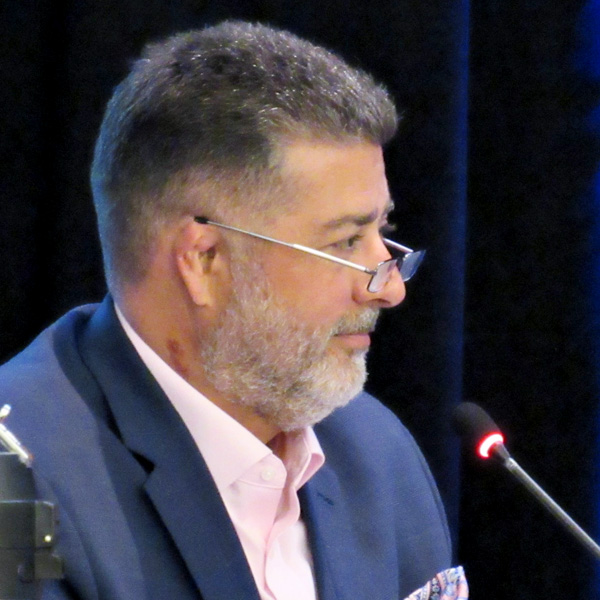INDIANAPOLIS, Ind. — MISO and its membership shared their common experience with the employee churn caused by the COVID-19 pandemic.
The MISO community discussed industry reverberations from The Great Resignation, as the ongoing economic trend is called. It was the subject of the quarterly Hot Topic chat before the Advisory Committee Wednesday during MISO Board Week.
 MISO’s Todd Hillman | © RTO Insider LLC
MISO’s Todd Hillman | © RTO Insider LLC
“Many call this a once-in-a-lifetime occurrence,” Todd Hillman, MISO’s senior vice president and chief customer officer, said in opening the discussion. “What we’re seeing is the wave of change is not so much about leaving work but trading up.”
Hillman said the tightening labor market is caused in part by Baby Boomers, especially men, leaving the workforce and fewer young people taking their place. He said that trend is exacerbated in the male-heavy energy industry.
Compensation packages and work flexibility have become increasingly important in holding onto employees, Hillman said.
Clean Grid Alliance’s (CGA) Natalie McIntire said she’s worried about the high number of “important, key” MISO staff members that have recently left.
“We really want to encourage MISO to act assertively to address any internal issues that’s keeping it from retaining employees,” McIntire said. She suggested the grid operator hire outside consultants to review its compensation and company culture.
Hillman said MISO is tapping outside expertise to gauge compensation “given how fast inflation is moving.”
CGA Executive Director Beth Soholt said the RTO’s employees are probably stressed from “stakeholders yelling at them,” daunting study work and pressures to deliver the grid of the future. MISO leadership has repeatedly mentioned the post-pandemic talent shortage as a challenge to completing market initiatives on time.
Cleco Cajun’s Tia Elliott said when jobs were at a premium before the pandemic, employees likely put up with more discontent to hang on to their paychecks.
Staff Turnover’s Budgetary Impacts
The grid operator’s year-to-date budget is becoming a study in how the tight labor market, red-hot inflation and constrained supply chains weigh on bottom lines. MISO’s base expenses are $2.4 million (2.6%) over budget, driven almost exclusively by higher salaries as it tries to retain and attract labor. The RTO’s project investment budget is about $500,000 (4.4%) below budget because of delays, deferrals and cancellations.
The grid operator expects to finish 2022 almost $6 million (2.1%) over its budget. That’s after it reduces some travel and employee training to offset the extra $8 million it must spend on salaries that it didn’t foresee at the beginning of the year.
“This has allowed us to keep our vacancy rate flat,” CEO John Bear said, explaining the extra salary spending before the board’s Audit and Finance Committee June 14. He said MISO began losing employees early during the Great Resignation and noted it’s more expensive to attract a new employee than to keep one.
CFO Melissa Brown said that because salaries and benefits make up such a large portion of the MISO budget, those overruns are difficult to offset.
Director Barbara Krumsiek said employee attrition is “terribly expensive.” She said with inflation and salaries rising so quickly, you have to react and “have a finer pencil.”
 Constellation Energy’s John Orr | © RTO Insider LLC
Constellation Energy’s John Orr | © RTO Insider LLC
Constellation Energy’s John Orr said he “wholeheartedly disagrees” that employees want good a company culture over strong compensation. He said most importantly, people want to be paid for the value they bring to an organization.
“If you think … pay for performance isn’t the single most motivating factor, you’re seriously misleading yourself,” he said. “People will put up with a lot of BS if they’re being paid well. It happens every day. … Does it sound kind of mean? Yes, but it’s human nature.”
But Krumsiek said she worried that a pay structure that handsomely rewards its most aggressive employees might stifle progress on diversity, equity and inclusion.
“People want to be rewarded for the work they do,” regardless of their backgrounds, Orr said. If managers “have only one type of person working for them, then there’s something wrong.”
McIntire said the environmental sector hasn’t experienced the same degree of turnover that other companies may have. She explained that it’s boom time for renewable energy organizations, and they’re retaining employees and hiring others to keep up with the changing energy landscape.
Soholt also said CGA is “biting the bullet” and hiring more junior staff and taking the time to train them.
“It’s a phenomenon and something we’re going to have to do because there are just not enough people to go around,” she said.
Soholt said her organization is discussing salary adjustments for existing employees. She advised other MISO member companies to publish salary ranges on job postings.
“That saves time for the applicant and the person who is looking to hire,” she said.
ITC Holdings’ Brian Drumm said his company is experiencing higher voluntary departures.
“It’s not really hard to hire a new person, [but] it takes longer, and new people are coming in with more demands,” Drumm said.
Multiple members said job seekers now expect some ability to work from home.
North Dakota Public Service Commissioner Julie Fedorchak said one silver lining is that a dramatic number of exits at the commission have brought in employees with new ideas.
“There’s so much work that needs to be done. It’s very pressing, important work. … People are leaving MISO, and new people are coming in,” director Nancy Lange said.
She said burnout can quickly become an issue with the energy industry’s intense workloads, but MISO is encouraging staff to take vacation time.
Solholt said it’s important for employees to not only take vacation time, but to take uninterrupted time where they aren’t “texting from their children’s events.”
“You really need to have a good time, go to the cabin and disconnect. I want us to go back to that,” she said.




